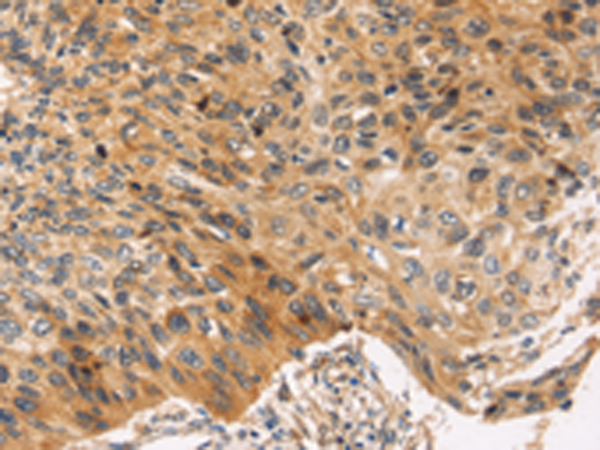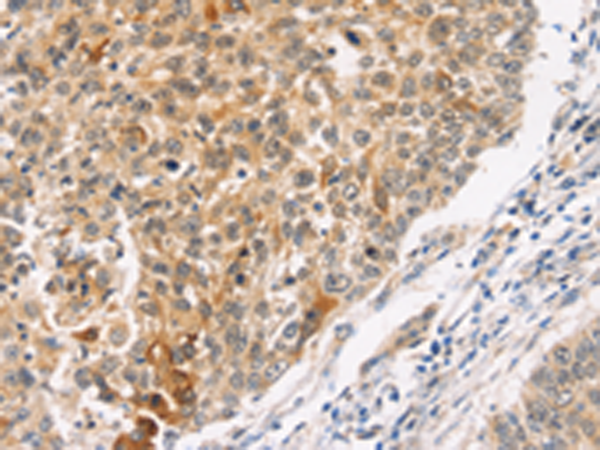


| WB | 咨询技术 | Human,Mouse,Rat |
| IF | 咨询技术 | Human,Mouse,Rat |
| IHC | 1/25-1/100 | Human,Mouse,Rat |
| ICC | 技术咨询 | Human,Mouse,Rat |
| FCM | 咨询技术 | Human,Mouse,Rat |
| Elisa | 1/2000-1/5000 | Human,Mouse,Rat |
| Aliases | JNK2, SAPK, p54a, JNK2A, JNK2B, PRKM9, JNK-55, SAPK1a, JNK2BETA, p54aSAPK, JNK2ALPHA |
| WB Predicted band size | 48 kDa |
| Host/Isotype | Rabbit IgG |
| Antibody Type | Primary antibody |
| Storage | Store at 4°C short term. Aliquot and store at -20°C long term. Avoid freeze/thaw cycles. |
| Species Reactivity | Human, Mouse, Rat |
| Immunogen | Synthetic peptide of human MAPK9 |
| Formulation | Purified antibody in PBS with 0.05% sodium azide and 50% glycerol. |
+ +
以下是关于MAPK9抗体的3篇参考文献的简要信息:
1. **文献名称**:*Role of JNK (MAPK9) in Parkinson’s Disease Pathogenesis: A Novel Therapeutic Target*
**作者**:Smith A, et al.
**摘要**:该研究利用MAPK9特异性抗体,通过Western blot和免疫组化分析发现JNK2在帕金森病模型中异常激活,并验证其在多巴胺能神经元凋亡中的关键作用,提示抑制JNK2可能具有治疗潜力。
2. **文献名称**:*MAPK9 Antibody-Based Detection of Oxidative Stress-Induced Activation in Hepatocellular Carcinoma*
**作者**:Chen L, et al.
**摘要**:作者开发了一种高特异性MAPK9抗体,用于检测肝癌细胞中氧化应激触发的JNK2磷酸化水平,发现其与肿瘤侵袭性呈正相关,为肝癌预后提供了潜在标志物。
3. **文献名称**:*Differential Roles of JNK Isoforms in Cardiac Hypertrophy Revealed by MAPK9-Specific Antibody*
**作者**:Rodriguez J, et al.
**摘要**:研究通过特异性MAPK9抗体区分JNK1与JNK2在心肌细胞肥大中的功能差异,证实JNK2通过调控Akt/mTOR通路促进病理性心脏重构,为靶向治疗提供依据。
MAPK9 (Mitogen-activated protein kinase 9), also known as JNK2 (c-Jun N-terminal kinase 2), is a member of the serine/threonine protein kinase family within the MAPK signaling pathway. It plays a critical role in mediating cellular responses to extracellular stimuli, such as stress, cytokines, and growth factors. MAPK9 is activated through dual phosphorylation on threonine and tyrosine residues by upstream MAP2Ks (e.g., MKK4/7), which itself is regulated by a cascade of kinases. Once activated, it translocates to the nucleus and phosphorylates transcription factors like c-Jun, ATF2. and p53. modulating gene expression involved in apoptosis, proliferation, differentiation, and inflammation.
MAPK9 antibodies are essential tools for detecting and quantifying MAPK9 protein levels, phosphorylation status, and localization in various biological samples. These antibodies are widely used in techniques such as Western blotting, immunohistochemistry (IHC), immunofluorescence (IF), and flow cytometry. Researchers employ them to study MAPK9's role in diseases, including cancer (where it may act as a tumor promoter or suppressor depending on context), neurodegenerative disorders, and metabolic syndromes. Specific antibodies targeting phosphorylated MAPK9 (e.g., p-Thr183/Tyr185) help assess its activation state under experimental conditions, providing insights into pathway dynamics. Validation of antibody specificity via knockout controls or peptide blocking is critical to ensure reliable data interpretation.
×